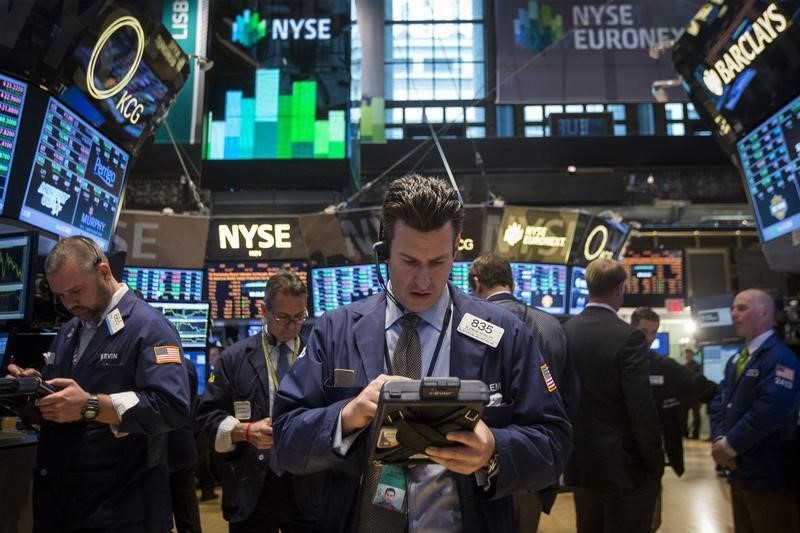Investing.com-- The S&P 500 and Nasdaq wrapped up a strong week with record closes on Friday, underpinned by slump in Treasury yields and an Nvidia-led surge in chip stocks as the latest quarterly results from tech continue to point to accelerating artificial intelligence demand.
By 16:00 ET (21:00 GMT), the Dow Jones Industrial Average was up 98 points, or 0.3%, S&P 500 gained 0.8% to close at 5,136.23, while NASDAQ Composite jumped 1.1% to a record 16,274.94.
Fed’s Waller remarks, weaker data sink Treasury yields
Fed governor Christopher Waller said Friday he would like to see the U.S. central bank shift its holdings more toward short-term Treasuries, sending the yield on the 2-year Treasury 11 basis points lower to 4.54%.
Data on Friday showing consumer sentiment unexpectedly slipped in February, and manufacturing activity deteriorating further into contraction territory boosted hopes for an earlier rate cut in further blow to Treasury yields to boost growth sectors including tech.
Markets are pricing in a rate cut in June, according to Investing.com’s Fed Rate Monitor Tool.
Nvidia (NASDAQ:NVDA) closes above $2T for first time as Dell, Netapp, Hewlett Packard results underscore AI demand
Nvidia-led a surge in chip stocks to close above $2 trillion for the first time ever as bullish quarterly results from enterprise hardware makers including Dell showed demand for AI-enabled hardware including chips continued to accelerate.
Dell Technologies (NYSE:DELL) surged 31% on stronger-than-expected earnings and guidance as solid demand for its artificial intelligence-optimized servers offset weakness in personal computing.. Dell’s AI backlog at the end of the quarter for GPU servers was $2.9B, up about 80% from $1.6B last quarter.
Hewlett Packard Enterprise Co (NYSE:HPE), meanwhile, reported softer guidance, pressured by ongoing weakness in the PC market, and reported AI server shipments of $400M and $3B of backlog. The stock rose 2%, shrugging off negative remarks on Wall Street. "The stock remains relatively inexpensive, but given the flat outlook and ongoing macro concerns we view the risk/reward in HPE as balanced," UBS said in a note.
NetApp (NASDAQ:NTAP) soared 18% on a strong outlook for 2024 amid an improving demand backdrop following a period of stagnant demand. The company's "new solutions appear to target block specifically and could allow NTAP to significantly grow its TAM if they succeed in penetrating the market," Wedbush said in a note.
Fisker tumbles after flagging financial trouble; New York Community Bancorp warns of material weaknesses in internal controls
Electric vehicle maker Fisker (NYSE:FSR) plummeted more than 34% after it warned of a substantial doubt over its ability to stay afloat amid waning EV demand and production setbacks. The company said, however, that it was in talks with an large automaker to potentially secure funds and detailed plans to cut its workforce by 15% as it looks to strengthen its finances.
New York Community Bancorp (NYSE:NYCB) tumbled nearly 26% after the embattled regional lender said it had found "material weaknesses" in company controls related to an internal loan review, stoking further worries about its exposure to commercial real estate loans.
Vista Outdoor (NYSE:VSTO) rose 6% after the Wall Street Journal reported that the sporting and outdoor products group has received a $2.9 billion takeover offer, including debt from investment firm MNC Capital.
Boeing reportedly eyes Sprit Aerosystems takeover amid pressure to step-up quality control
Boeing Co (NYSE:BA) is currently in talks to acquire its supplier Spirit Aerosystems Holdings Inc (NYSE:SPR), The Wall Street Journal on Friday, citing unnamed sources, sending shares of the latter up 14%.
The move comes as Boeing pressure is mounting on the aircraft maker to restore its credibility after a recent string of issues affecting 737 MAX jets including the Alaska Airlines door blowout in January that was linked to faulty door plug supplied by Spirit AeroSystems.
Earlier this week, the U.S. Federal Aviation Administration ordered Boeing to develop a comprehensive plan to address quality-control issues within 90 days.
(Peter Nurse, Ambar Warrick contributed to this article.)
